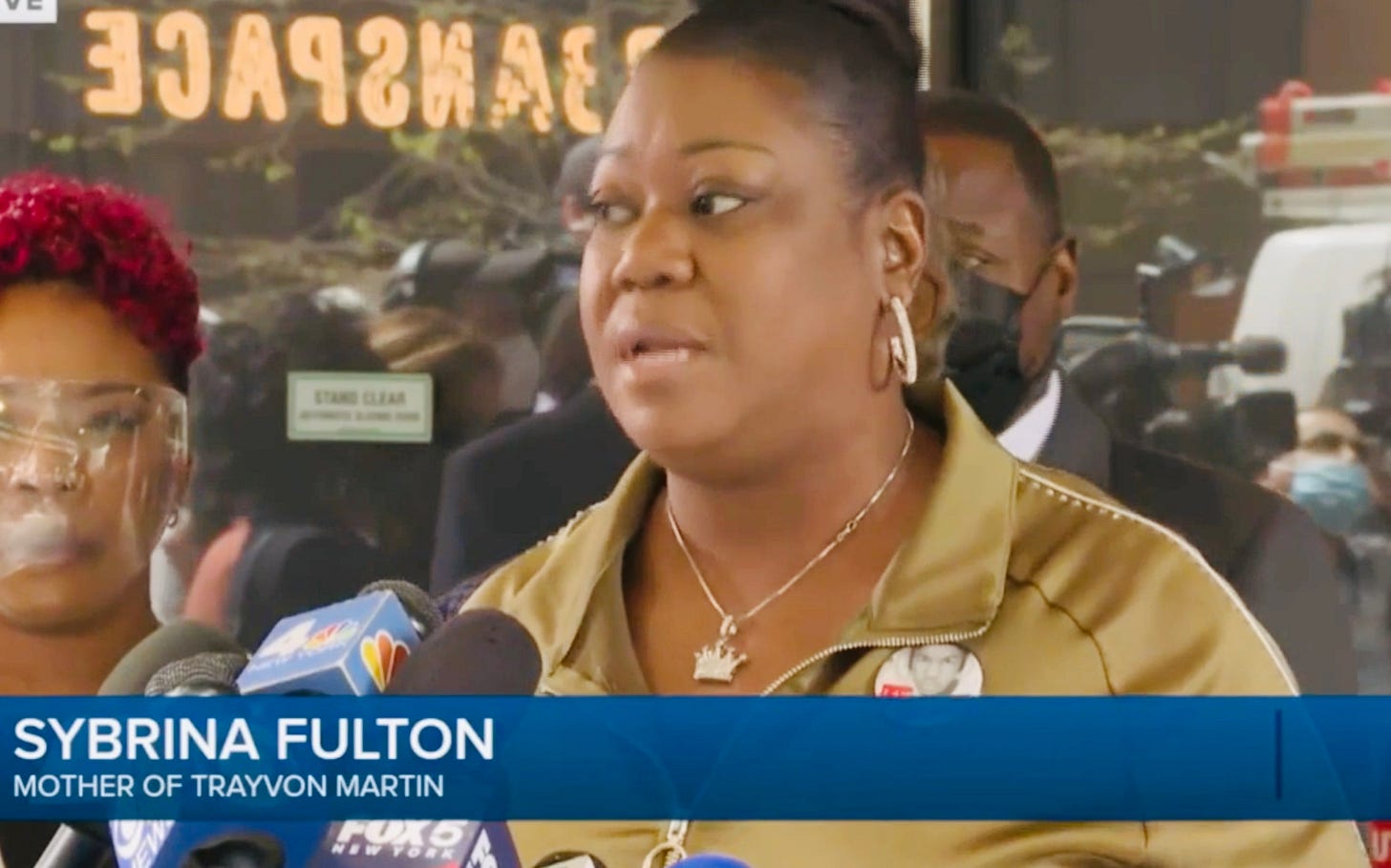SheFlexx April 2021
Darkness and Stars

Hope, Interrupted
This newsletter got interrupted - I had first thought to make it about spring and blossoming: the (possible) beginning of the end of the pandemic, new ways of understanding and claiming our beauty as older women, and various other points of hope. Then amidst the Derek Chauvin trial came the killing of Daunte Wright and the video of Adam Toledo’s killing and hope seemed very very far away indeed. I strive to make this newsletter optimistic but I realized - with a nod to MLK - that before we could see the “stars,” we must first acknowledge the darkness.
Sybrina Fulton, above, said: “Whoever said time heals all wounds did not lose a child. Because we are never going to heal. This country has done something to us that will never be repaired.”
That truth has to be faced. Each one of these killings leaves a family bereft and inconsolable, while also re-traumatizing Black people generally, especially Black men and boys. Mothers of the Movement is led by women whose African-American children have been killed by police officers, who publicly share their experiences of losing a son or daughter to police violence and advocate for political change. So for these moms? The triggering is profound. And yet they stand up and speak out.
I think something Dr. Bernice King, MLK’s daughter, said after the shootings in Atlanta applies to George Floyd, Daunte Wright, Adam Toledo (and far far too many others), and also to their mothers: may your names and your sparks of divinity beckon us to live higher, to love deeper, and to leave hate behind.
While prosecutions of police who kill have risen since George Floyd’s death, another part of the darkness is that so much more needs to change. In 1984, self-proclaimed black, lesbian, mother, warrior poet Audre Lorde explained why there was not an automatic sisterhood between white feminist women and feminist women of color:
“Some problems we share as women, some we do not. You fear your children will grow up to join the patriarchy and testify against you; we fear our children will be dragged from a car and shot down in the street, and you will turn your backs on the reasons they are dying.” — from "Age, Race, Class, and Sex" (1984).
In 2016, Santa Clara University Law professor Margalynne Armstrong’s article asked “Are We Nearing the End of Impunity for Taking Black Lives?” tracing US law’s failure to protect black lives, noting that while progress was made during the civil right era, police violence remains “the last bastion of impunity for killing African Americans…”
So what can we Flexxers do? Here are suggestions from 13 Black women leaders. One of my favorites from the list is “Create a Plan of Activism.” Black women leaders are at the forefront of so many struggles, including the struggle against voter suppression measures. Women leaders over 50 are also critical to this fight. Let’s be those women or stand behind those women.
The stars I can make out in this time of darkness are often women of experience. Like the Mothers of the Movement. Also newly-confirmed Interior Secretary Deb Haaland, who is shining light on the epidemic of missing and murdered indigenous women in the US and Canada, and doing something about it. Another point of light is newly-elected St. Louis mayor Tishaura Jones, the first black woman mayor of that city, who says, “we are done avoiding race and the way it holds this region back.” Or hard-working, unheralded researcher Kati Kariko whose determination over decades to uncover the promise of mRNA enabled the Pfizer and Moderna coronavirus vaccines, and may in the future lead to vaccines against cancer. Or Dr. Purnima Devi Barnam and her Halgira Army, a grassroots group of women intent on saving the endangered, maligned, and striking Major Adjutant stork.
I’ll finish this section noting this lovely photo shoot and article featuring women of experience and what gives them hope in these dark times. We’ll return later to explore more deeply the beauty of age, but for now, I’ll just ask: what is more beautiful than women who have lived and lost yet rise to share their humanity?
In case you’re still not convinced - or even if you are - treat yourself to this poem by Jeannette Encinias. Yes, you.
SheFlexx Respects
Beloved American author Beverly Cleary, who died on March 26, 2021 at age 104. Cleary gave us the irrepressible tween character Ramona the Pest. Along with Astrid Lindgren’s Pippi Longstocking, Ramona gave girls the freedom to have adventures, skin their knees, be messy, and ultimately triumph. All pest wishes, Beverly.
Samantha Flores, 88, socialite, gay bar proprietor, advocate for trans people, and most recently founder and director of Vida Alegre, a community center in Mexico City for lonely elders. Somewhere as part of a rainbow.
Chandro Tomar, 89, believed to be the world’s oldest professional sharpshooter. She defied her husband and other male relatives who tried to forbid her from going to the shooting range in India and has since become a champion and a feminist icon. Ready. Aim. Power.
SheFlexx Recs
Privilege Revealed: How Invisible Preference Undermines America by Stephanie Wildman, (with Margalynne Armstrong, of the law review article mentioned above). The book gives language to identify and understand privilege and argues against “color-blindness” and for “color insight.”
Discovering or rediscovering the poetry of Audre Lorde. Oprah has suggestions for where to start/continue.
Trevor Noah dubbed the six silver-haired back up singers “Da Baby Boomers.” They propelled Da Baby to the most talked-about performance at the Grammys, which Mean Magazine called “a mash-up of culture the likes of which the world needs to see more of.” Click the photo to see the whole performance.
